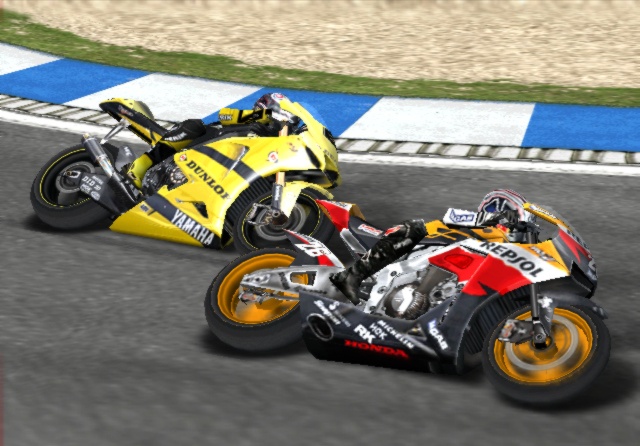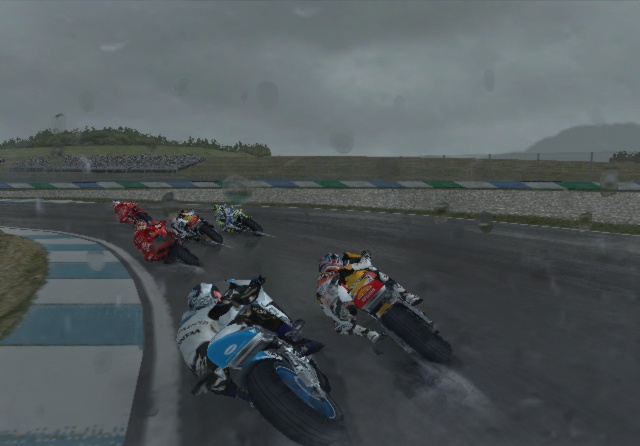Don't let the name fool you. This is not the PlayStation 2 debut of THQ and Climax's long-running and critically acclaimed motorcycle racing series. Capcom now has the MotoGP license, and the inaugural game of the series has now arrived with little fanfare and on a last-generation system. The relatively subdued debut aside, MotoGP 07 is a decent start for the series, one that overcomes its flat-out ugly graphics with plenty of challenge and a good sense of two-wheeled gusto.

Let's start with the bad news: This is an ugly game. With unattractive, indistinct textures and only so-so rider animations, this looks like a first-generation PS2 game (and sometimes, a last-generation PlayStation game). The tracks themselves feature plenty of detail--buildings, grandstands, paddock areas, and the like--in the backgrounds, which is OK, but all of it is rather drab and indistinct. Despite those shoddy graphics, the game has a decent frame rate, which is probably more important in a racing game anyway. Still, for those already accustomed to the high-definition era of gaming, MotoGP 07 will be a visual step back that will take some time to readjust to.
You'll need a good stretch longer to adjust to the challenge level in MotoGP 07. It's obvious that developer Milestone has gone for a more realistic and demanding version of motorcycle racing than Climax did with its relatively approachable game. In a racing genre that rewards smoothness every lap, the riding model in MotoGP 07 practically demands it. The game has two handling models, arcade and simulation. When playing in simulation mode, the main factor is wheelspin--it's extremely easy to get your rear tire spinning and smoking because you're turning in to a corner too late. In fact, when your rider is at the lowest point of a corner, with his knee just millimeters above the tarmac, giving the bike full throttle will more often than not result in your merely spinning your wheels, both literally and figuratively, and often wiping out in the process. As a result, you quickly learn to modulate your throttle for a smooth exit out of the turns. Anything less will cost you precious tenths (or more) from your lap time. Naturally, the arcade handling setting is more manageable, as it puts less of an emphasis on wheelspin out of the corners.
Despite the relatively demanding physics, the game's controls are easy to learn. Like any motorcycle game worth its salt, MotoGP 07 lets you control your front and rear brakes independently, and you can even assign the buttons on your PS2 controller to whatever setup you have in mind. Those who are more accustomed to automobile racing games can use the right analog stick for acceleration and braking, which works just fine. The game also features multiple camera angles to choose from in the race, from first-person views in the saddle to the more useful third-person views that give you a higher vantage point.
The game includes four difficulty levels, but unless you are the virtual version of Valentino Rossi, you're going to struggle at any level higher than medium. This is partially because of the speed and skill of the AI riders you're racing against, but also because of the patently absurd times you'll need to beat in qualifying. Consider the 2007 Turkish Grand Prix as an example. The real-life pole position for that race was 1:52.795. At the easy difficulty level, you're required to get a 1:48.01 to grab pole position, and that time gets more and more ludicrous as you move up in difficulty. Starting at the back of the pack isn't necessarily a problem on the easy level, since it's relatively easy to overtake riders; doing so on the medium difficulty levels and up is a considerable challenge. As a result, your qualifying position becomes much more important, but thanks to the aforementioned qualifying challenge, you'll be hard pressed to start anywhere near the front of the pack.

With no online multiplayer to speak of in MotoGP 07 (there is a splitscreen mode for two players), the heart of the game is undoubtedly the championship mode. Here, you run through the 18 rounds of the 2007 MotoGP championship, driving as and against any of the 21 racers that competed during the season (even Jeremy McWilliams and Andrew Pitt, whose Ilmor team dropped out of the series after the first race of the season). You can't create a rider from scratch, nor is there any sort of bike customization beyond some basic tuning options; this is bare-bones racing for points and nothing else. As you win races, either in championship mode or elsewhere in the game (such as in the quick race mode), you can beat preset challenges that will reward you with race pictures of various MotoGP riders. You can access these challenges in their own mode as well, and some of the early ones are useful for teaching about the fundamentals of motorcycle racing, including acceleration, braking, and sticking close to the racing line.
Ugly visuals, a relatively shallow list of game modes, and some imposing difficulty stand as the barriers to entry for MotoGP 07. That said, those willing to shield their eyes, grit their teeth, and put the time in will find a strong single-player race experience that will certainly reward consistent effort. It's a bit surprising that Capcom has chosen to err on the side of simulation with MotoGP 07, but for purists, it bodes well for the future of the series.